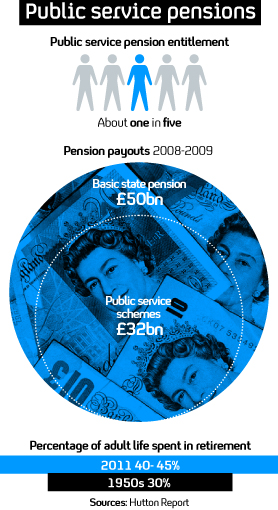Public sector pension shake-up
Public sector workers should expect to work longer and receive lower pensions, a report by Lord Hutton suggests – the perfect recipe for industrial action, writes Economics Editor Faisal Islam.

The report aims to strike a “balanced deal” between public sector workers and the taxpayer at a time when the population is living longer and pension costs are rising.
It suggests revamping the public sector pension scheme completely, including changing how the pensions are calculated. Pensions should no longer be related to people in the public sector’s final salary, it suggests, but instead measured against average pay over an individual’s working life.
Retirement ages for most public sector workers should also be increased to 65 from 60, in line with the national state pension age – and workers and employers will also be expected to contribute more to pensions, and the taxpayer less.
Pensions based on career average earnings will be fairer. Lord Hutton
Lord Hutton said: “These proposals aim to strike a balanced deal between public service workers and the taxpayer. They will ensure that public service workers continue to have access to good pensions, while taxpayers benefit from greater control over their costs.
“Pensions based on career average earnings will be fairer to the majority of members that do not have the high salary growth rewarded in final-salary schemes.”
Perfect recipe for industrial action?
"Let's go through that again, massively higher pensions contributions, working for years longer, for a much worse pension, and all at a time when cuts threaten their jobs. And remember this is the only matter about which it is possible to have legal mass industrial strife. Little wonder why the Prime Minister's union tsar, Richard Balfe told me that the Coalition needed to find a way of smoothing out this pain."
Read more from Faisal Islam on the pension reform: a recipe for strife
Changes
Lord Hutton said that the changes, if enforced, would not be retro-active. As such, past contributions would be linked to the final salary scheme. Only future earning will be subject to any changes – and new workers would be enrolled into the new career average scheme.
If the Government approves the recommendations, the changes could be in place by 2015. The Government has already approved a previous call for public sector workers to pay higher contributions into their pension pot.
Pensionable age could change for many public sector workers – rising from 60 to 65 – which is also shortly to rise to 66 – in line with the state pension age. For the police, armed forces and fire service, who have a lower normal pension age, Lord Hutton advised this should rise to 60.
The police, armed forces and fire service have an even lower normal pension age, and Lord Hutton has advised that this should change to 60 years-old in due course.
FactCheck: thin blue line in the firing line?
Who Knows Who: pensions czar John Hutton

Reactions
The unions warned that the changes had brought industrial action a step closer.
Dave Prentis, head of Unison, said: “Whatever the Hutton report may say about fairness, the government will use it as a Trojan horse to raid the pensions of hard working public sector workers. Pensions that our members have paid into year in year out and which are fair and affordable…There is a lot of nonsense talked about public sector pensions – they are not gold plated.
I am sending out a clear message to our 1.4 million members warning them that industrial action is now one big step closer. Dave Prentis, Unison
“Asking workers to work longer for less is simply not an option. We want to talk to the Government about their response as a matter of urgency. But I am sending out a clear message to our 1.4 million members warning them that industrial action is now one big step closer.”
But experts told Channel 4 News the changes had to happen.
Andrew Cawley, Head of Pensions at KPMG, said: “The main issue is around the sustainability of long term public sector finances, as a result of people living a lot longer than when these schemes were set up and designed.”
Alison Bailey, Policy Director at The Pensions Advisory Service, said they are expecting an increase in phone calls from workers worried by the reforms, but said they were “well balanced” and “necessary” to bring public sector pensions in line with the private sector.
The reforms will affect all public sector workers, she said – from soldiers to teachers to council workers – but in slightly different ways. For example, there is added protection for the “uniformed” services – police, firemen and soldiers – as the Government recognises they are special occupations. Their retirement age will only be increased to 60 – rather than in line with the state pension age, which is going up to 66 soon. There will also be protection for low earners who will have to contribute more to their pension, she said.
“There is a misconception of public sector ‘gold plated’ pensions but the people we talk to in the workplace are working part time, on low earnings, they are women who have taken a career break to have children, people who
Your reaction
The Government says the changes are necessary to make the system fairer - and affordable. But it seems from your comments on Facebook and Twitter that you are not convinced.
Jeremy Weekes: "We can all thank Labour for bankrupting this country. There is only enough money left for Brown's golden pension, oh the irony."
David Andrew Cowan: "Being a 22 year old I resent the baby boomer generation, ruining my future."
Bryan Searle: "The public employee pensions are a disgrace and have to be changed. You would not get this in the private sector."
Robert Ander Lugg: "This is a disgrace! Pay freezes, mass redundancies and now an attack on our pensions. Let's be clear: we pay plenty for our pensions and have to give decades of hard work to earn them."
David McGrath: "Why is it so ridiculous for everyone else to have to follow suit - 3 years after everyone else??"
MyriadCS1 working longer for less, been doing that since 2007 #construction
bluestaffie if people are working for longer, where are the jobs for the next generation? No wonder this country has soo many problems.
dcbcherrygate Working longer for less? Sounds like what those of us in private sector have been doing for years #c4news